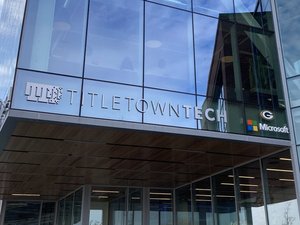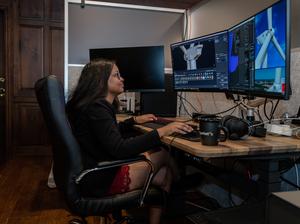
When the United States became the first country in the world to land on the moon 50 years ago this July, the world was in awe.
Neil Armstrong and Buzz Aldrin had successfully landed on the moon, something no one had ever done before. The milestone forged a path for astronauts and scientists in the years to come to explore more of the galaxy and discover what out there can be an asset to Earth.
Most tech and startup companies aren’t quite trying to land on the moon (unless they are SpaceX or Blue Origin), but many have set out on ambitious missions to solve some of the world’s most pressing problems.
Mountain View, Calif.,-based Waymo, Alphabet’s self-driving car business, is working to drastically transform the way we get around. And Chicago-based Tempus is using machine learning and genomic sequencing to develop a better method for treating cancer tumors so that people can live longer, healthier lives.
Closer to home in the state of Wisconsin, several tech startups are working to tackle problems that affect everyday lives. Whether it’s developing a better system to detect cancer or helping businesses understand weather events as the Earth increasingly becomes destabilized by climate change, the five companies below are taking big swings at big problems, working to make lives easier, safer and happier.
For those with severe food allergies, accidentally eating something they are sensitive to could be deadly. But a Madison startup is developing a device to ensure no one ever has to guess whether a dish could give them an allergic reaction again.
Founded in 2016, Allergy Amulet is developing a disposable test strip that can determine within one minute whether food has particular allergens in it. The device will be able to test for peanuts, shellfish and wheat, among other foods, and the company plans to launch pre-sales of its device this fall, with its first products shipping in fall 2020.
Allergy Amulet’s device is expected to cost between $150 and $250, and disposable test strips will cost $3 each.
“Allergy Amulet offers an additional layer of assurance for the food allergy community that foods prepared by others are safe,” said Founder and CEO Abigail Barnes. “We want to create a paradigm shift in food safety, because food should be a source of fuel, not fear.”
Since launching in 2016, Allergy Amulet has raised $1.5 million in seed funding, according to Crunchbase.
As more women are waiting to have children until later in life, fertility has become an issue in recent years for couples trying to conceive. The birthrate among women under 30 has been falling steadily since 2010, according to data from the National Center for Health. As a result, more women are turning to technology to help them track their menstrual and ovulation cycles as they aim to pinpoint the best time to try to get pregnant.
BluDiagnostics, a biotech startup in Madison, is developing a device that tests women’s hormones from just a sample of saliva. Co-founded by Katie Brenner while she was a postdoctoral student at the University of Wisconsin-Madison, BluDiagnostics’ tool can be used at home to predict ovulation, identify hormonal problems and test for pregnancy.
BluDiagnostics won the 2015 Wisconsin Governor’s Business Plan Contest in Madison. The startup has raised $4.6 million in debt financing since launching in 2012, according to Crunchbase.
Prostate cancer is the No. 2 killer of men in the U.S. Beginning in the 1980s, physicians began screening men for the disease fairly aggressively by testing for prostate-specific antigens (PSA). But in 2008, that screening method slowed down as data began to show that the aggressive testing approach was leading to over-diagnoses and over-treatment, which exposes men to infection, incontinence and impotence.
But as a result of the more cautious approach, men that do have prostate cancer haven’t been able to catch it as quickly. Gregor Diagnostics, a Madison startup founded by Tobias Zutz, is working to rectify the problem.
“We’re now screening less men and what you’re seeing is that we’re not catching the aggressive cancer,” said Zutz, who previously worked at Exact Sciences, the Madison-based molecular diagnostics company that’s created a better system to test for colon cancer. “So we're creating a better test that is more sensitive and specific than PSA, and also can differentiate between these low-risk cancers and the aggressive cancers.”
Gregor Diagnostics says its system can test men for prostate cancer through seminal fluid as opposed to blood or urine. Because the function of the prostate is to produce seminal fluid, Gregor Diagnostics’ research shows that it will have higher concentrations of the biomarkers needed to detect cancer. Plus, this method allows patients to collect a sample at home and ship it to Gregor’s lab for testing, rather than having to visit a healthcare facility.
Founded three years ago, Gregor Diagnostics was a 2016 participant in gener8tor’s gBeta program and raised a $1 million seed round last year to grow the team and launch an upcoming clinical trial to test its system as it works toward FDA approval.
Zutz said the company’s system is still about four years away from being on the market, but if and when it is approved, it can help simplify cancer screening and save more lives.
“By having a test that’s more accurate and can make this differentiation, we can send just the patients who most likely have aggressive cancer to the invasive biopsy and spare the men that don’t need it or won’t benefit from it,” Zutz said.
If you’ve ever played the Sims, taking one glance at the virtual customer assistants made by idAvatars will remind you of characters in the game. They’re very detailed—with different hairstyles, skin tones and features. They’re rocking their own unique personalities and to some degree, have a mind of their own.
idAvatars, founded in 2013 in Mequon, is in the business of creating virtual customer assistants for companies that engage in conversations with their customers online. Made with artificial intelligence, idAvatars is able to give specific personalities and character traits to the virtual assistants that match the identity of the company they represent.

The startup, which raised nearly $3 million in venture capital, focuses on building its avatars with human behavior as opposed to the robotic persona that chatbots often possess. idAvatar’s Founder Norrie Daroga imagines that in the future, each company will have their own idAvatar that consumers will recognize and seamlessly associate with particular companies, sort of like a mascot, but one that is completely digital and can assist with complex problems.
“Everybody told me I had been watching too many Hollywood movies and that it wasn’t possible,” Daroga said. “But technology has certainly improved and become much more commonplace with Alexa and Google Voice…so people are used to talking to [robots]. The difference is that our company puts a face to the voice."
Daroga said idAvatars are ideal for businesses across a variety of industries, including healthcare, real estate, finance and insurance. The tool can help businesses save time by allowing their digital assistants to answer consumers' most basic questions, while they get back to the more complicated work. So far, the startup has created avatars for about 20 companies, such as United Healthcare, Guardian Life Insurance and Keller Williams Realty.
“It’s a very powerful branding tool,” Daroga said. “That’s why you have to design it well and figure out the little touches that make the personality shine through.”
As weather becomes more unpredictable and severe with the onset of climate change, having tech to help companies deal with weather events in the most time- and cost-effective ways is becoming more important than ever.
To address the problem, Madison startup Understory has created solar-powered weather stations that collect, analyze and process weather data from the ground level. This makes the startup’s tech more accurate than satellites and other methods used to collect weather data in the past.
Founded in 2012 by Alex Kubicek, Understory says its data can help a range of industries detect risk and make better business decisions. It can be used by insurance, agriculture, academic, utility and broadcasting companies.
Just in May, Understory closed a $5.25 million Series B round led by True Ventures, with participation from 4490 Ventures and Revolution’s Rise of the Rest Seed Fund, bringing Understory’s total funding to more than $22 million.
With the financing, Understory has been able to deploy more than 600 stations within five major metropolitan areas and on multiple continents.
“It’s really important to better understand how weather is changing due climate change,” Kubicek said. “After weather occurs, companies don’t really know what happened.”
For example, if a hail storm rips through a particular community and damages homes and vehicles, insurance companies don’t truly know the full impact of the damage until their policyholders start calling in to file claims, Kubicek said. Using Understory’s tech, insurance companies can receive data on weather events in real time, allowing to them to allocate resources sooner to those affected by it.
“Weather impacts a company’s bottom line,” Kubicek said. “By using this technology, they can better understand exactly what happened and what steps they need to take.”
To check out moonshots in all 13 Inno markets, click here.








